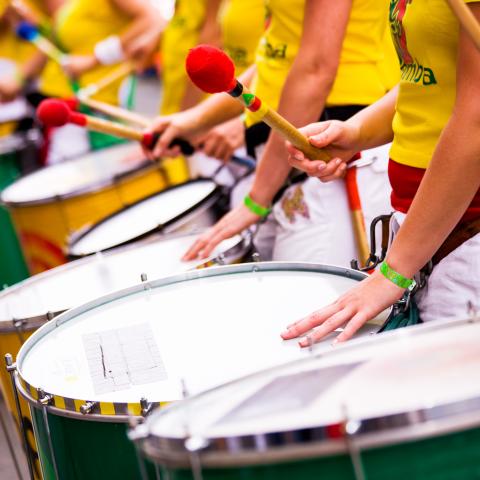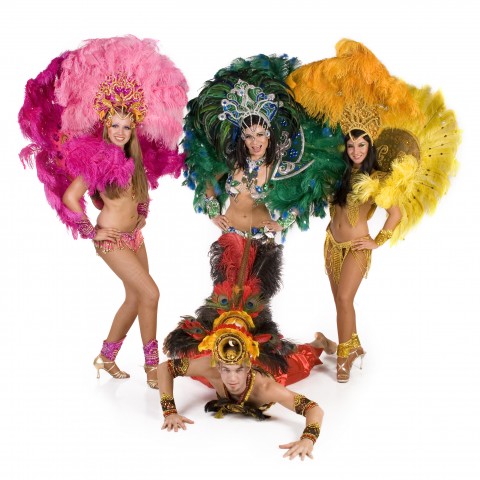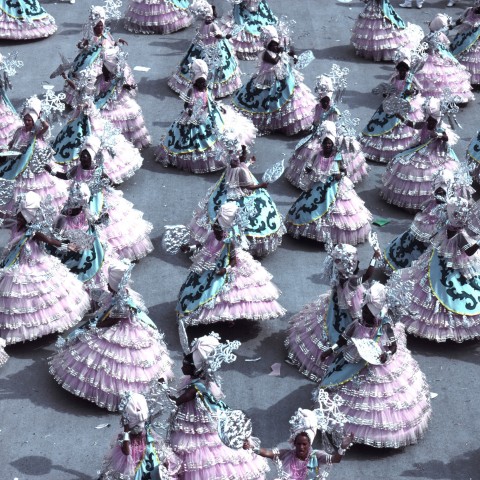Carnival is probably the most famous Brazilian holiday in the world. It’s also the largest “collective party” in the country.
Many people associate Carnaval with samba or Rio, but in this lesson, you will discover that Carnival is much more than that. We’ll tell you how Carnival is celebrated in other parts of Brazil and what we Brazilians normally do at this time.
As you learn more about Carnaval in Brazil (sometimes called El Carnaval Brazil), you’ll gain a deeper understanding of Brazilian and Portuguese culture. Thanks for letting PortuguesePod101.com be your guide! Let’s get started.
1. What is What is Carnaval in Brazil?
The Carnival festival in Brazil is a time of dancing and general fun before the upcoming Lent season. This holiday is widely celebrated around the world, but the Brazil Carnival experience puts a fascinating twist on celebrations you’ll find elsewhere.
From Portuguese Carnival masks to the unique music and dances, the Brazil Carneval is not something to be missed or easily forgotten.
2. When is Carnival in Brazil?
The date of the Carnival Season in Portugal varies each year, as it depends on the date of Easter. For your convenience, here’s a list of this holiday’s date for the next ten years:
- 2019: March 4
- 2020: February 24
- 2021: February 15
- 2022: January 31
- 2023: February 20
- 2024: February 12
- 2025: March 3
- 2026: February 16
- 2027: February 8
- 2028: February 28
Carnival is normally in mid-February. Even though some schools start their semester before Carnival, for the majority of students, the end of Carnival marks the true end of the summer holiday.
3. Reading Practice: How is Carnival Celebrated?
Read the Portuguese text below to find out how the Carnival is celebrated in Brazil. You can find the English translation directly below it.
—–
Assim como muitas tradições brasileiras, o Carnaval chegou ao Brasil por meio dos portugueses, primeiro com o nome de entrudo, costume de brincar no período de carnaval, e depois bailes carnavalescos e carnavais de rua. No começo do século vinte as escolas de samba começaram a evoluir, e nas últimas décadas, algumas capitais construíram seus sambódromos, especialmente para o Carnaval.
Embora o Carnaval do Rio seja o mais conhecido mundialmente, o Carnaval de São Paulo, Salvador, Ouro Preto, Recife e Olinda, Fortaleza, Manaus e Florianópolis são muito renomados no país. No Rio e São Paulo, a principal atração é o desfile das escolas de samba da cidade. Em Salvador, milhares de foliões seguem os trios elétricos ao som de muito axé. Em Recife e Olinda, o ritmo é o frevo e maracatu. Cada cidade tem sua singularidade. Mas a ordem do dia é a mesma: se divertir e dançar muito!
—–
Like many other Brazilian traditions, Carnival came to Brazil through the Portuguese, first by the name of entrudo, which is the custom of playing during the period of Carnival, and afterwards Carnival-type dances and street carnivals. At the beginning of the twentieth century, the samba schools began to evolve, and in recent decades, some capital cities have built sambadromes, just for Carnival.
Even though Carnival in Rio is the most well known in the world, those in São Paulo, Salvador, Ouro Preto, Recife and Olinda, Fortaleza, Manaus, and Florianópolis are very well-known throughout the country. In Rio and São Paulo, the main attraction is the city’s samba schools parade. In Salvador, thousands of event participants follow large trucks playing axé music. In Recife and Olinda, the rhythm is frevo and maracatu. Each city has its own take on Carnival. But the order of the day is the same—have fun and dance a lot!
4. Additional Information
If you want to go to the large Brazilian Carnivals, often it is necessary to reserve your place as much as a year in advance.
But beyond those, each city also commemorates Carnival in its own way. In most cities, people walk through the streets, and some wear costumes (trust us, you won’t soon forget seeing a Brazilian Carnaval outfit!), to watch the samba schools parade, and also to dance, have fun, throw party foam on your friends and lose yourself in the revelry! Since Carnival is normally a prolonged holiday, many use that time to travel, generally to the coast.
5. Must-know Vocab
Here’s some vocabulary you should know for Carnival in Portugal!
- Carnaval — “Carnival”
- Axé — “Axé music”
- Samba — “Samba”
- Maracatu — “Maracatu”
- Escola de samba — “Samba school”
- Frevo — “Frevo”
- Fantasia — “Costume”
- Abadá — “Abadá”
- Sambódromo — “Sambadrome”
- Marchinha de carnaval — “Carnival little march”
- Bloco carnavalesco — “Carnival block”
- Rainha da bateria — “Queen of the drums at a Carnival parade”
- Passista — “Person who dances samba at Carnival parades”
- Pular carnaval — “Celebrate carnival”
- Máscara — “Mask”
- Desfile — “Parade”
If you want to hear each vocabulary word pronounced, check out our Portuguese Carnival vocabulary list. Here you’ll find each word accompanied by an audio of its pronunciation.
Conclusion
We hope you enjoyed learning about the Brazil Carnaval! Do you celebrate Carnival in your own country, or a similar holiday? Let us know in the comments!
To learn more about Brazilian culture and the Portuguese language, visit us at PortuguesePod101.com! We offer an array of insightful blog posts, free vocabulary lists, and an online community to discuss lessons with fellow Portuguese learners!
Keep up the hard work and continue delving into all things Portuguese. You’ll reap the benefits and talk like a native in no time!













